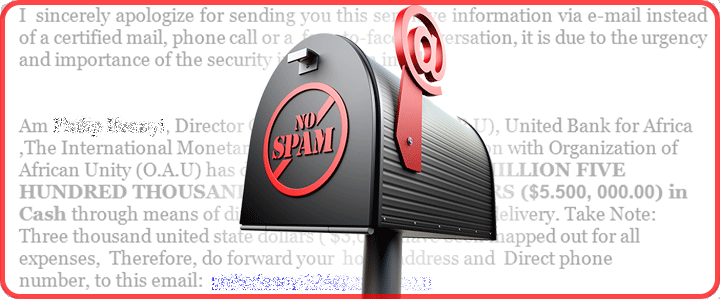Spam and phishing emails are getting harder and harder to detect as fraudsters use ever more sophisticated techniques to avoid automatic detection and deletion. While many email platforms have software to filter out scam emails, these sophisticated phishing mails can still get through to your inbox.
Firstly, why do spam and phishing emails exist?
Fraudsters using phishing emails have various goals, for example they attempt to collect and steal your personal, electronic, and financial information. Another goal is to install applications with add-ins to infect your computer with malicious software, in some cases encrypting all your files and folders and holding you to a ransom to reverse the procedure.
So here are a few tips and tricks to detect spam emails and prevent phishing attacks.
1) Watch for unknown, odd email addresses.
Fraudsters can fake the friendly name in the senders email address in order to cover their dodgy email address with more genuine looking ones. However, if you’re unsure, simply hover over the email address or double click on the email address to see who it’s really from.
2) View the URL or link before clicking on anything.
Emails can appear to be from a legitimate address but have an unsafe URL or link. If you are unsure that the link is safe, you can safely hover over it to see the real URL. When hovering your mouse over the link, the actual link address will either appear on the bottom left hand corner of the screen or directly over the link text.
3) Make sure you have the latest version of anti-spam & anti-virus software installed.
Fraudsters are constantly coming up with new techniques to bypass spam detection. Should you accidentally click on a phishing link, a good anti-virus software can prevent your computer from getting infected with malware. More importantly they are constantly updated with new versions to keep up to date with new viruses and malware.
4) If it’s too good to be true, chances are it is spam.
Sometimes emails are easier to spot, such as a stranger from a foreign country offering you millions of $$$’s. However it can also appear to be from an institution you may know or use about an application being approved, large rewards or free products. Be vigilant, think if you have actually applied for anything and check the links.
5) Trusted Sources will not ask you to input information.
Remember, trusted companies such as banks, or services such as PayPal will never ask you to click on a link or reply to an email to input information. They will also address customers by their names.
6) Watch out for emails that contain threats of suspension or warnings.
This is a common tactic to prompt you to act quickly in a panic. These emails usually ask for immediate action of a payment or personal information. Take your time to go through this, decide whether you really do owe anything.
7) Most importantly, if you are unsure, call the institution directly.
Search for the company website on Google and call the number from there to see if it is a genuine request.
Some good rules to remember:
- Don’t open attachments unless you know who they are from and trust the person or company.
- Look out for spelling mistakes or bad grammar. Even something as simple as missing out on capital letters. For example Paypal instead of PayPal.
- Make sure to block such emails or list them as spam so they don’t come into your inbox in future.
- Be especially wary if the address is a set of numbers. Reputable or trusted companies will generally use words instead of numerals.
Finally, what to do if you think you’ve clicked on a link.
The first thing to do is to immediately change your passwords, especially if they are common passwords that you use across many sites. Also make sure to call your bank to set up an alert if you are concerned that any funds may be removed.
Lastly, notify your IT team or IT support provider as soon as possible. A good IT Support team will investigate further, ensure you have the latest software installed and report the scam website to prevent a similar attack in future.
Contact us if you have concerns about any emails you receive or for a review of your current anti-spam & anti-virus software. No Problem Technologies are on hand to provide advice, check the current status of your software and install any necessary updates.
________________________________________________________________________
Hassle Free IT – The Easy Way!
No Problem Technologies provides comprehensive and affordable Fully Managed IT services.
We look after all aspects of your IT for one fixed monthly fee, including broadband, IT Support, Office 365, online backup, Voice over IP, domain names and web hosting.
This means our fixed-price contracts for on-site and remote support will free up valuable time for your business to grow, while our technical expertise will provide you with ongoing security and peace-of-mind.








